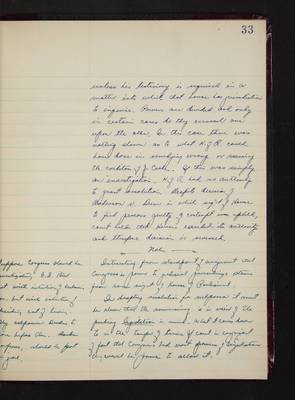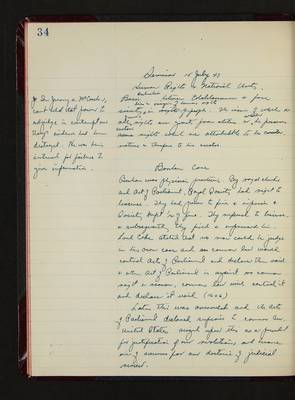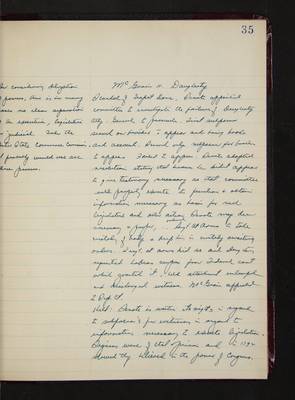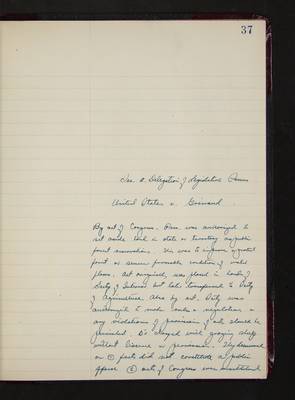Pages
36
33
unless his testimony is required in a matter into which that power has jurisdiction to inquire. Powers are divided and only in certain cases do they encroach one upon the other. In this case there was nothing shown as to what H. of R. could have done in remedying wrong or securing the creditor of J Cooke. If this was simply an investigation, H. of R. had no authority to grant resolution. Despite decision of Anderson v. Deems in which right of House to find persons guilty of contempt was upheld, court holds that House exceeded its authority and therefore decision is reversed. ———————Notes——————— (Suppose Congress should be investigating G.I. Bill not with intention of declaring (...) but with intention of deciding cost of living. [They] subpoena (...) to come before them. (...) refuses, should be put in jail.) Interesting from standpoint of argument that Congress's power to judicial proceedings stems from same right of House of Parliament In drafting resolution for subpoena it must be shown that the summoning is in view of the pending legislation in mind. What it comes down to is the temper of times. If court is cognizant of fact that Congress has vast powers of legislation they would be prone to allow it.
37
34
Seminar 15 July 47 Human Rights & National Unity Basic distinction between totalitarianism & free society lies in origin of {rights of people} human rights. The issue of whether as all of men's rights are grants from states or whether he possesses {some} certain rights which are attributable to his {creator} nature & therefore to his creator.
(In Jurney v McCracken court held that power to adjudge in contempt and [that] evidence had been destroyed. He was being sentenced for failure to give information.)
Bonhan Case Bonhan was physician practicing. By royal charter and Act of Parliament, Royal Society had right to license. They had power to fine & imprison & Society kept 1/2 of fine. They refused to license & subsequently they fined imprisoned him. Lord Coke stated that no man could be judge in his own case and {so} common law would control Acts of Parliament and declare them void & when Act of Parliament is against {so} common right & reason, common law will control it and declare it void. (1606) Later this was overruled and the acts of Parliament declared superior to common law. United States seized upon this as a precedent for justification of our revolution, and became one of sources for our doctrine of judicial review.
38
35
(In considering delegation of powers, there is in many cases no clear separation [to] the executive, legislative or judicial. Take the United State Commerce Commission. It probably would use all three powers.)
McGrain v Daugherty Scandal of Teapot Dome. Senate appointed committee to investigate the failure of Daugherty Atty General to prosecute. First subpoena served on brother to appear and bring books and account. Second only subpoena for brother to appear. Failed to appear. Senate adopted resolution stating that because he didn't appear to give testimony necessary so that committee could properly execute its function & obtain information necessary as basis for such legislative an other actions Senate may deem necessary & proper, ∴ ordered Sergt at Arms to take custody of body & keep him in custody awaiting orders. Sergt. at Arms did so and [Daugherty] requested habeas corpus from Federal court which granted it, held attachment unlawful and dicharged witness. McGrain appealed to Sup. Ct. Held: Senate is within its rights in regard to subpoena's for witnesses in regard to information necessary to exercise legislation. Origins were of that opinion and in 1792 showed they believed in the power of Congress.
39
36
∴ Court is of opinion that Houses have not only such powers as specifically granted in Constitution but such auxiliary powers as are necessary and appropriate to make the express power effective. These auxiliary powers are limited however. Argument that these powers would lead to oppression is not sustainable since you could say the same about power to legislate. Also doctrines of Kilbourn v Thompson and In re Chapman point to admissable measure of relief. ② Court held that committee was investigating Atty. General and they had no power to do so. This was not true, resolution specifically stated that investigation was in regard to proper legislative measures to the [like]. The Senate had right because they controlled Justice Dept. though appropriation. Order reversed. ————————Notes———————
40
37
Sec. 2 Delegation of Legislative Powers
United States v Grimaud
By act of Congress, Pres. was authorized to set aside land in state or territory as public forest reservations. This was to improve & protect forest or secure favorable condition of water flows. Act originally was placed in hands of Secty of Interior but later transferred to Secty of Agriculture. Also by act, Secty was authorized to make rules & regulations & any violations of provisions of acts should be punished. D's charged with grazing sheep without license or permission. They demurred on ① facts did not constitute a public offense ② acts of Congress were unconstitutional




